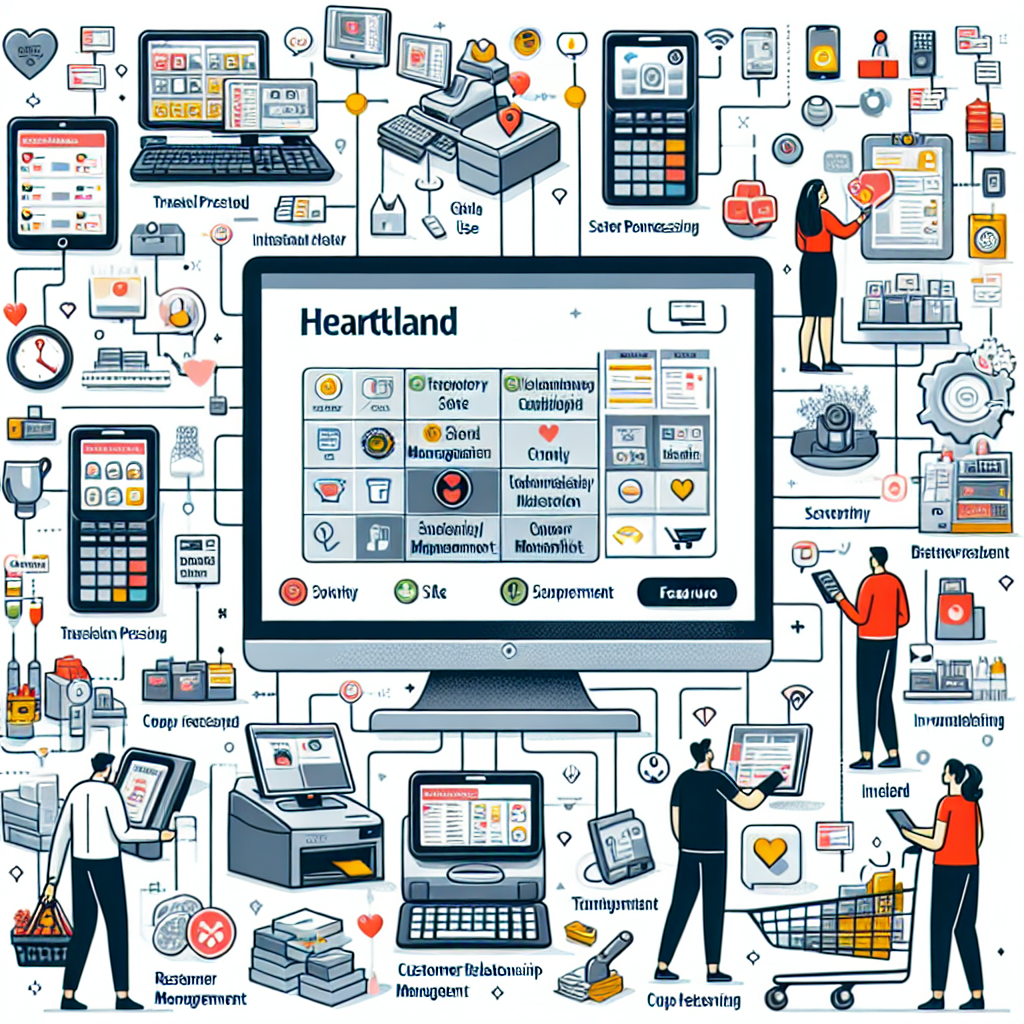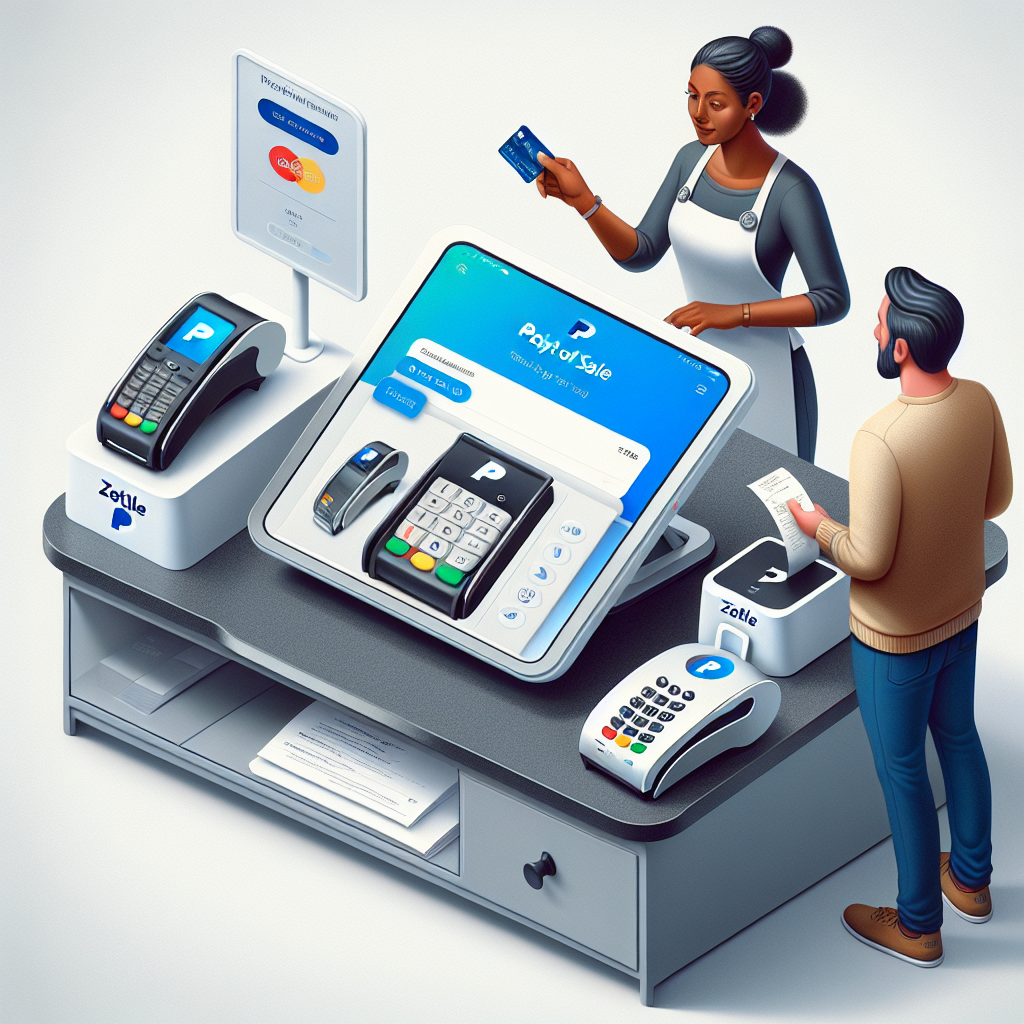Epos Now is a prominent player in the point-of-sale (POS) industry, offering a comprehensive and versatile solution designed to cater to the needs of various businesses, from retail stores to hospitality venues. Known for its user-friendly interface and robust functionality, Epos Now provides a cloud-based platform that enables seamless management of sales, inventory, and customer relationships. With features such as real-time reporting, customizable dashboards, and integration capabilities with third-party applications, Epos Now aims to enhance operational efficiency and improve customer experiences. This review delves into the key aspects of Epos Now’s POS system, evaluating its performance, ease of use, and overall value to help businesses determine if it aligns with their operational requirements and growth objectives.
Comprehensive Overview Of Epos Now POS Features
Epos Now POS is a versatile point-of-sale system designed to cater to a wide range of business needs, from retail stores to hospitality venues. This comprehensive overview delves into the features that make Epos Now POS a compelling choice for businesses seeking efficiency and reliability. At the core of Epos Now POS is its user-friendly interface, which simplifies the process of managing sales, inventory, and customer interactions. The system is designed to be intuitive, allowing staff to quickly learn and navigate its functionalities with minimal training. This ease of use is particularly beneficial in fast-paced environments where time is of the essence.
Transitioning to the system’s adaptability, Epos Now POS offers a high degree of customization, enabling businesses to tailor the platform to their specific requirements. Whether it is modifying the layout of the sales screen or integrating third-party applications, the system provides flexibility to accommodate diverse operational needs. This adaptability extends to its compatibility with various hardware options, including tablets, computers, and traditional POS terminals, ensuring that businesses can implement the system without significant infrastructure changes.
Moreover, Epos Now POS excels in inventory management, a critical aspect for any retail or hospitality business. The system provides real-time tracking of stock levels, allowing businesses to monitor inventory with precision and avoid overstocking or stockouts. This feature is complemented by automated reordering capabilities, which streamline the supply chain process and ensure that popular items are always available for customers. Additionally, the system’s reporting tools offer valuable insights into sales trends and inventory performance, empowering businesses to make informed decisions based on data-driven analysis.
In terms of customer relationship management, Epos Now POS includes features that enhance the customer experience and foster loyalty. The system supports the creation of customer profiles, which can be used to track purchase history and preferences. This information is invaluable for personalizing marketing efforts and tailoring promotions to individual customers, thereby increasing engagement and retention. Furthermore, the system’s integration with loyalty programs and gift card functionalities provides additional incentives for customers to return, ultimately driving repeat business.
Security is another critical consideration for any POS system, and Epos Now POS addresses this with robust measures to protect sensitive data. The system is compliant with industry standards, including PCI DSS, ensuring that customer payment information is handled securely. Regular software updates and data encryption further enhance the security framework, providing peace of mind for businesses and their customers alike.
Transitioning to the support and scalability aspects, Epos Now POS offers comprehensive customer support services, including 24/7 assistance and a wealth of online resources. This support infrastructure is crucial for businesses that require immediate resolution of technical issues to maintain operational continuity. Additionally, the system is designed to scale with business growth, accommodating additional users, locations, and features as needed. This scalability ensures that Epos Now POS remains a viable solution for businesses at any stage of development.
In conclusion, Epos Now POS presents a robust and flexible solution for businesses seeking to optimize their point-of-sale operations. Its user-friendly interface, extensive customization options, and comprehensive feature set make it a standout choice in the competitive POS market. By addressing key areas such as inventory management, customer relationship management, security, and support, Epos Now POS provides a holistic platform that can adapt to the evolving needs of businesses across various industries.
Pros And Cons Of Epos Now POS System
The Epos Now POS system has garnered attention in the retail and hospitality sectors for its user-friendly interface and comprehensive features. As businesses increasingly seek efficient solutions to streamline operations, understanding the pros and cons of the Epos Now POS system becomes crucial for informed decision-making. On the positive side, one of the most significant advantages of Epos Now is its intuitive design, which simplifies the training process for new employees. This ease of use is particularly beneficial for businesses with high staff turnover, as it reduces the time and resources spent on training.
Moreover, Epos Now offers a cloud-based system, allowing business owners to access their data from anywhere with an internet connection. This feature is invaluable for managers who need to oversee multiple locations or those who prefer to monitor their business remotely. Additionally, the system’s scalability is noteworthy. Whether a business is a small café or a large retail chain, Epos Now can adapt to varying needs, offering a range of hardware and software options to suit different business sizes and types.
Another advantage is the extensive integration capabilities of Epos Now. The system can seamlessly connect with various third-party applications, such as accounting software, CRM systems, and online ordering platforms. This integration facilitates a more cohesive business operation, enabling data synchronization across different platforms and reducing the likelihood of errors. Furthermore, Epos Now provides robust reporting and analytics tools, empowering business owners with insights into sales trends, inventory levels, and customer behaviors. These insights can drive informed decision-making, ultimately enhancing business performance.
However, despite these advantages, there are certain drawbacks to consider. One potential downside is the cost associated with Epos Now. While the initial investment may be manageable for some businesses, ongoing subscription fees and additional costs for certain features or integrations can add up over time. This financial aspect may be a concern for small businesses or startups operating on tight budgets. Additionally, while the system is generally user-friendly, some users have reported occasional technical glitches or system downtime. Such issues, although not widespread, can disrupt business operations and may require technical support to resolve.
Moreover, while Epos Now offers a range of features, some businesses may find that they require additional customization to meet their specific needs. This customization can sometimes be limited, depending on the complexity of the requirements, potentially necessitating workarounds or additional software solutions. Furthermore, customer support experiences with Epos Now have been mixed. While some users praise the responsiveness and helpfulness of the support team, others have encountered delays or less satisfactory resolutions to their issues.
In conclusion, the Epos Now POS system presents a compelling option for businesses seeking a versatile and user-friendly point-of-sale solution. Its cloud-based nature, scalability, and integration capabilities are significant advantages that can enhance business operations. However, potential users should weigh these benefits against the associated costs, occasional technical issues, and the need for possible customization. By carefully considering these factors, businesses can determine whether Epos Now aligns with their operational needs and long-term goals. As with any business decision, thorough research and evaluation are essential to ensure that the chosen POS system supports the business’s growth and success.
Epos Now POS Pricing And Packages Explained
Epos Now, a prominent player in the point-of-sale (POS) industry, offers a range of pricing and package options designed to cater to diverse business needs. Understanding these options is crucial for businesses seeking to optimize their operations with a reliable and efficient POS system. Epos Now’s pricing structure is both flexible and transparent, allowing businesses to select a package that aligns with their specific requirements and budget constraints.
To begin with, Epos Now offers a straightforward pricing model that includes both upfront and subscription-based options. This dual approach provides businesses with the flexibility to choose between a one-time purchase or a monthly payment plan. The upfront purchase option is ideal for businesses that prefer to make a single investment, thereby avoiding recurring costs. On the other hand, the subscription model is suitable for those who prefer to spread the cost over time, making it easier to manage cash flow.
Moreover, Epos Now’s packages are tailored to accommodate various business sizes and types, ranging from small retail stores to large hospitality venues. The core package typically includes essential hardware such as a touchscreen terminal, receipt printer, and cash drawer, along with the Epos Now software. This comprehensive package ensures that businesses have all the necessary tools to manage sales, inventory, and customer interactions effectively.
In addition to the core package, Epos Now offers several add-ons and integrations that enhance the functionality of the POS system. These optional features allow businesses to customize their POS setup according to their unique operational needs. For instance, businesses can integrate accounting software, customer relationship management (CRM) tools, and e-commerce platforms to streamline their processes further. This level of customization is particularly beneficial for businesses with specific requirements that go beyond the standard POS functionalities.
Furthermore, Epos Now provides industry-specific packages that cater to the distinct needs of different sectors. For example, the retail package includes features such as inventory management and customer loyalty programs, while the hospitality package offers table management and kitchen display systems. These tailored solutions ensure that businesses in various industries can leverage the full potential of the Epos Now POS system to enhance their operational efficiency.
Another noteworthy aspect of Epos Now’s pricing and packages is the availability of support and training services. Epos Now offers comprehensive customer support, including 24/7 assistance and access to a dedicated account manager. This level of support is invaluable for businesses that require prompt resolution of technical issues or guidance on optimizing their POS system. Additionally, Epos Now provides training resources to help businesses and their staff become proficient in using the system, thereby maximizing its benefits.
In conclusion, Epos Now’s pricing and packages are designed to offer flexibility, customization, and support to businesses of all sizes and industries. By providing a range of options, Epos Now ensures that businesses can select a POS solution that meets their specific needs and budgetary constraints. Whether opting for an upfront purchase or a subscription model, businesses can benefit from a comprehensive POS system that enhances their operational efficiency and customer service capabilities. With its industry-specific packages and robust support services, Epos Now stands out as a reliable choice for businesses seeking a versatile and effective point-of-sale solution.
User Experience: Navigating The Epos Now POS Interface
The Epos Now POS system has garnered attention for its user-friendly interface, which is designed to streamline operations for businesses of all sizes. As users navigate the Epos Now POS interface, they are greeted with a clean and intuitive layout that prioritizes ease of use. This design philosophy is evident from the moment the system is launched, as it presents a dashboard that is both visually appealing and functionally efficient. The dashboard serves as the central hub, providing quick access to essential features and tools, thereby minimizing the time spent searching for specific functions.
Transitioning from the dashboard to other areas of the system is seamless, thanks to the well-organized menu structure. The menu is logically arranged, allowing users to effortlessly locate various modules such as sales, inventory, and reporting. This logical arrangement is particularly beneficial for new users who may not yet be familiar with the system’s full capabilities. Moreover, the use of clear labels and icons further enhances the navigational experience, reducing the learning curve typically associated with adopting new technology.
In addition to its intuitive navigation, the Epos Now POS interface is highly customizable, which is a significant advantage for businesses with unique operational needs. Users can tailor the interface to suit their specific requirements, whether that involves rearranging menu items or creating shortcuts for frequently used functions. This level of customization ensures that the system can adapt to a wide range of business environments, from retail stores to hospitality venues. Furthermore, the ability to personalize the interface contributes to increased efficiency, as users can configure the system to align with their workflow preferences.
Another noteworthy aspect of the Epos Now POS interface is its responsiveness. The system is designed to perform optimally across various devices, including tablets and smartphones, which is crucial for businesses that require mobility. The responsive design ensures that the interface remains consistent and functional, regardless of the device being used. This consistency is vital for maintaining productivity, as it allows users to switch between devices without having to adjust to a different layout or functionality.
Moreover, the Epos Now POS system supports a range of integrations, which enhances its overall usability. By seamlessly integrating with popular third-party applications, the system extends its capabilities beyond basic point-of-sale functions. These integrations enable businesses to manage their operations more holistically, from accounting and marketing to customer relationship management. The ease with which these integrations can be implemented further underscores the user-friendly nature of the Epos Now POS interface.
In terms of support, Epos Now offers comprehensive resources to assist users in navigating the system. From detailed user guides to video tutorials, these resources are designed to empower users to make the most of the system’s features. Additionally, the availability of customer support ensures that any issues or queries can be promptly addressed, thereby minimizing disruptions to business operations.
In conclusion, the Epos Now POS interface stands out for its user-centric design, which facilitates smooth navigation and efficient operation. Its intuitive layout, coupled with customization options and responsive design, makes it a versatile solution for a diverse range of businesses. By prioritizing user experience, Epos Now has created a POS system that not only meets the demands of modern businesses but also enhances their operational efficiency.
Epos Now POS Customer Support And Service Evaluation
Epos Now, a prominent player in the point-of-sale (POS) industry, has garnered attention for its comprehensive solutions tailored to various business needs. A critical aspect of any POS system is the quality of customer support and service, which can significantly impact user experience and operational efficiency. In evaluating Epos Now’s customer support and service, it is essential to consider several factors, including accessibility, responsiveness, and the range of support options available to users.
To begin with, Epos Now offers a variety of support channels designed to cater to diverse customer preferences. Users can access support through phone, email, and live chat, ensuring that assistance is readily available regardless of the medium preferred. This multi-channel approach is particularly beneficial for businesses that may require immediate assistance during peak operational hours. Furthermore, Epos Now provides an extensive online knowledge base, which includes articles, guides, and video tutorials. This resource empowers users to troubleshoot common issues independently, thereby reducing the need for direct support intervention.
In terms of accessibility, Epos Now’s support services are available 24/7, a feature that is crucial for businesses operating outside of standard business hours. This round-the-clock availability ensures that users can receive timely assistance, minimizing potential disruptions to their operations. Moreover, the company’s commitment to providing continuous support reflects its understanding of the dynamic nature of retail and hospitality environments, where issues can arise at any time.
Responsiveness is another critical component of effective customer support, and Epos Now appears to excel in this area. Many users report prompt responses to their inquiries, with issues often being resolved swiftly. This efficiency is indicative of a well-trained support team that is knowledgeable about the product and capable of addressing a wide range of technical and operational concerns. Additionally, Epos Now’s support staff is frequently praised for their professionalism and courteous demeanor, which contributes to a positive customer experience.
Beyond immediate support, Epos Now also offers onboarding and training services to help new users acclimate to the system. These services are designed to ensure that businesses can maximize the potential of their POS system from the outset. By providing comprehensive training, Epos Now helps users understand the full range of features and functionalities available to them, thereby enhancing their ability to leverage the system effectively. This proactive approach to customer service underscores the company’s commitment to long-term user satisfaction.
However, it is worth noting that some users have expressed concerns regarding the occasional difficulty in reaching support during high-demand periods. While these instances appear to be exceptions rather than the norm, they highlight the importance of maintaining adequate staffing levels to handle peak times. Addressing this issue could further enhance the overall customer support experience.
In conclusion, Epos Now’s customer support and service offerings are robust and well-rounded, providing users with multiple avenues for assistance and ensuring that help is available when needed. The company’s dedication to accessibility, responsiveness, and comprehensive training reflects a strong commitment to customer satisfaction. While there is always room for improvement, particularly in managing high-demand periods, Epos Now’s support services are generally well-regarded and contribute positively to the overall user experience. As businesses continue to navigate the complexities of modern retail and hospitality environments, reliable customer support remains a vital component of any successful POS system, and Epos Now appears well-equipped to meet these demands.
Comparing Epos Now POS With Competitors In The Market
In the ever-evolving landscape of point-of-sale (POS) systems, businesses are constantly seeking solutions that not only streamline operations but also enhance customer experience. Epos Now, a prominent player in this domain, has garnered attention for its comprehensive features and user-friendly interface. However, to truly understand its standing, it is essential to compare Epos Now with its competitors in the market. This comparison will provide insights into its strengths and potential areas for improvement.
To begin with, Epos Now distinguishes itself with its cloud-based platform, which offers flexibility and accessibility. This feature is particularly advantageous for businesses with multiple locations, as it allows for real-time data synchronization across all sites. In contrast, some competitors still rely on traditional, on-premise systems that may not offer the same level of convenience. Moreover, Epos Now’s system is compatible with a wide range of hardware, providing businesses the freedom to choose devices that best suit their needs. This adaptability is a significant advantage over competitors that may require proprietary hardware, potentially increasing costs.
Furthermore, Epos Now excels in its integration capabilities. It seamlessly connects with various third-party applications, including accounting software, e-commerce platforms, and marketing tools. This integration is crucial for businesses aiming to create a cohesive ecosystem that enhances operational efficiency. While some competitors also offer integration options, Epos Now’s extensive list of compatible applications sets it apart, providing businesses with more choices to tailor their systems to specific requirements.
In terms of user experience, Epos Now is lauded for its intuitive interface, which simplifies the learning curve for new users. This ease of use is a critical factor for businesses that may not have the resources for extensive training. Competitors, on the other hand, may offer systems that are equally powerful but require more time and effort to master. The straightforward design of Epos Now ensures that employees can quickly adapt, minimizing downtime and maximizing productivity.
However, it is important to consider the pricing structure when comparing Epos Now with its competitors. Epos Now offers a subscription-based model, which can be appealing for businesses looking to manage costs with predictable monthly fees. Nevertheless, some competitors provide more flexible pricing options, such as one-time purchases or tiered plans, which might be more suitable for businesses with varying needs and budgets. Therefore, while Epos Now’s pricing is competitive, it may not always be the most economical choice for every business.
Additionally, customer support is a critical aspect of any POS system. Epos Now offers 24/7 support, ensuring that assistance is available whenever needed. This level of support is a significant advantage over competitors that may have limited support hours or charge extra for premium support services. The availability of round-the-clock assistance can be a deciding factor for businesses that operate outside of standard business hours or in different time zones.
In conclusion, Epos Now presents a robust POS solution with its cloud-based platform, extensive integration capabilities, and user-friendly interface. While it offers several advantages over its competitors, such as flexibility and comprehensive support, businesses must carefully evaluate their specific needs and budget constraints. By doing so, they can determine whether Epos Now is the optimal choice or if another competitor might better align with their operational goals. Ultimately, the decision will depend on the unique requirements and priorities of each business.
Q&A
1. **Question:** What are the key features of Epos Now POS?
**Answer:** Epos Now POS offers features such as inventory management, real-time reporting, customer relationship management, employee management, and integration with various third-party applications.
2. **Question:** How user-friendly is the Epos Now POS system?
**Answer:** Epos Now POS is generally considered user-friendly, with an intuitive interface that is easy to navigate for both new and experienced users.
3. **Question:** What industries benefit most from using Epos Now POS?
**Answer:** Epos Now POS is versatile and benefits a range of industries, including retail, hospitality, and food service businesses.
4. **Question:** How does Epos Now POS handle customer support?
**Answer:** Epos Now POS provides customer support through various channels, including phone, email, and live chat, with 24/7 support available for urgent issues.
5. **Question:** What are the pricing options for Epos Now POS?
**Answer:** Epos Now POS offers flexible pricing plans, including a monthly subscription model and one-time purchase options, with additional costs for hardware and specific add-ons.
6. **Question:** Are there any notable drawbacks to using Epos Now POS?
**Answer:** Some users have reported drawbacks such as occasional software glitches, the need for additional costs for certain features, and varying levels of customer service experience.Epos Now POS is a versatile and user-friendly point-of-sale system that caters to a wide range of businesses, particularly in the retail and hospitality sectors. It offers a cloud-based platform with robust features such as inventory management, customer relationship management, and real-time reporting. The system is praised for its ease of use, flexibility, and scalability, making it suitable for small to medium-sized businesses looking to streamline operations and enhance customer service. However, some users have noted occasional technical issues and the need for additional costs for certain features and integrations. Overall, Epos Now POS is a solid choice for businesses seeking a comprehensive and adaptable POS solution.




